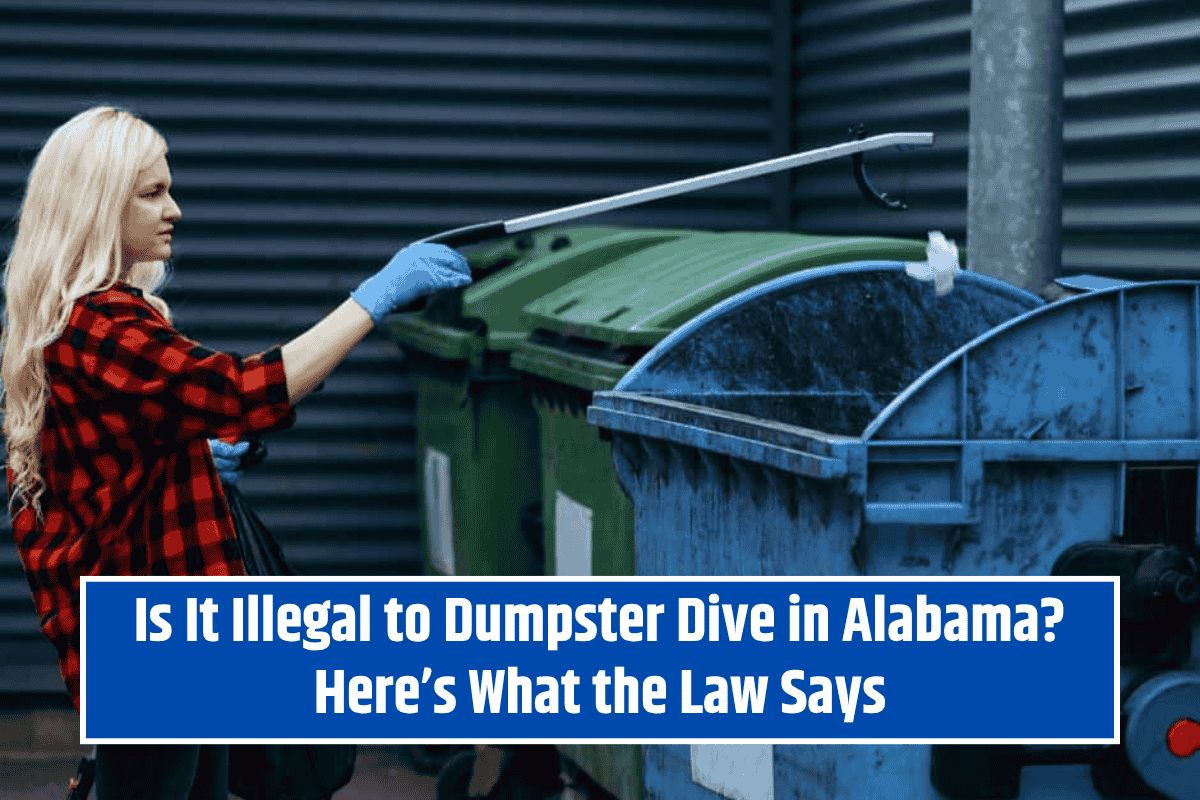If you’ve ever watched a video online where people find unexpected treasures in trash bins—like furniture, electronics, or even unopened food—you’ve probably come across the growing trend of dumpster diving. This activity is becoming more popular in the U.S., with many people taking part to find free items, save money, or help reduce waste. However, one important question comes up: is it legal? Let’s break down the rules in Alabama and what you should know to avoid getting into trouble if you’re considering giving dumpster diving a try.
What Is Dumpster Diving?
Dumpster diving is the practice of searching through trash bins or dumpsters to find items that have been thrown away but could still be useful. Some people call it “binning,” “garbing,” or “skipping.” It’s done for different reasons, including fun, saving money, or reducing waste by giving unwanted items a second chance.
Is Dumpster Diving Legal in Alabama?
In Alabama, dumpster diving itself isn’t directly illegal. It’s not a criminal activity just to look through trash bins. However, you need to be cautious because there are rules and situations that can make dumpster diving illegal. Here’s why:
Where You Dive Matters
The location of the dumpster plays a big role in whether your actions are legal or not. If you’re diving through bins on public property, such as a park or an area near public streets, it’s usually okay as long as you’re not causing a mess or breaking other laws. However, problems arise when the dumpster is located on private property.
If you climb over a fence, go through a gate, or enter a private property area to get to a dumpster, that’s considered trespassing, which is illegal. Trespassing can lead to serious consequences, like getting arrested, fined, or facing charges if the property owner takes legal action. The same applies if you damage a locked bin or ignore a “No Trespassing” sign—both can lead to criminal charges.
What About Businesses?
Dumpster diving behind businesses, such as stores or restaurants, is more complicated. The trash might be full of unwanted items, but the dumpster itself is on private property. If you want to dive in a dumpster behind a business, it’s important to ask for permission first. Without the proper consent, you could be charged with trespassing, even though the items in the dumpster aren’t technically “private.”
Many businesses now lock their dumpsters or put up warning signs to discourage dumpster diving. If you ignore these signs or try to open a locked dumpster, you could face legal consequences.
What Does the Law Say?
In a 1988 Supreme Court case called Greenwood v. California, the court ruled that trash left on public property is no longer considered private, so it can be accessed by the public. However, this doesn’t mean you can do whatever you want. You still have to respect local laws and rules, and if you’re on private land, you must get permission to be there.
Tips for Safe Dumpster Diving
If you’re interested in trying dumpster diving in Alabama, it’s important to follow some safety tips to stay within the law:
- Know the Rules: Always check your local city, county, and state regulations before diving into a dumpster.
- Stick to Public Areas: Only dive in places that are clearly public, like sidewalks or public parks.
- Don’t Break and Enter: Never climb over fences or break locks to access a dumpster.
- Leave It Clean: Always clean up after yourself and don’t leave any mess behind.
- Ask for Permission: If the dumpster is on private property, such as behind a business, ask for permission first.
Dumpster diving can be a fun and eco-friendly activity, but in Alabama, you need to be careful about where and how you do it. While dumpster diving itself isn’t illegal, actions like trespassing, damaging property, or ignoring posted warnings can get you into serious trouble. Always make sure you’re aware of local laws and respect private property to avoid fines or criminal charges. So, if you’re thinking of diving into a dumpster, a little knowledge and caution can go a long way in keeping you safe and legal.












